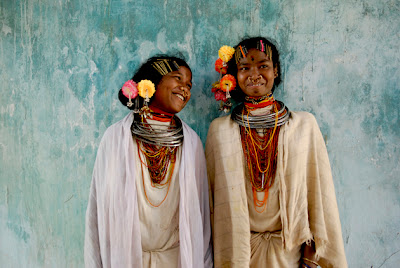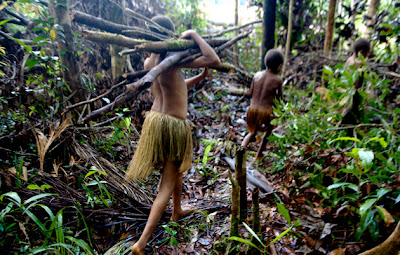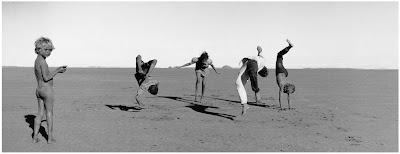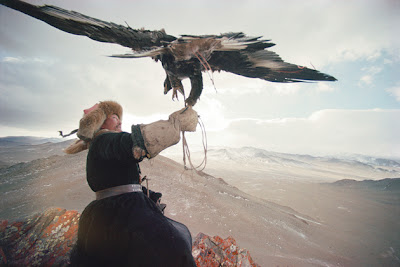We've got an extraordinary book to share with you today. Published by Survival International (an organization near and dear to our hearts, protecting the rights of tribal peoples worldwide), We Are One: A Celebration of Tribal Peoples was created and edited by Joanna Eede. THIS is a book for the ages - combining heartfelt essays from celebrities and tribal peoples with powerful photographs, it details the care that we as humans need to take with our environment and people.
Contributors include A.C. Grayling, Arundhati Roy, Bruce Parry, Colin Firth, Claude Lévi-Strauss, Damien Hirst, Don McCullin, George Monbiot, Germaine Greer, Jane Goodall, Joanna Lumley, Jonathon Porritt, Noam Chomsky, Richard Gere, Sebastião Salgado, Steve McCurry, Vandana Shiva, Wade Davis, Yann Arthus-Bertrand and tribal peoples from around the world.

Orissa, India © Jason Taylor/
From the moment when I first opened this book, I was drawn in. The photos share stories of lives far, far different than my own. The essays and quotes each lead you to a glimpse of life in another culture. I'd like to share some of the my favorite quotes from We Are One...
In those days my mother always took me with her into the forest to look for crabs, fish with timbo, or gather wild fruits. I would also go with her to the fields when we needed to harvest cassava, bananas, or to cut firewood. Sometimes the hunters would also call to me at daybreak when they left for the forest. I went with them and when they killed small game they would give them to me. THat was how I grew up in the forest.
Davi Kopenawa, Yanomami, Brazil
The great difference between the indigenous and the Western world is that we live in communities we feel at home with our brothers of our group, of our people, of our indigenous nation. Together we are strong. The individual is important as a member of the whole. Our ancestors had no experience of Western individualism. We cannot conceive of it for our children.
Evaristo Nugkuag Ikanan, Aguaruna, Peru
I do not think the measure of a civilisation is how tall its buildings of concrete are, but rather how well its people have learned to relate to their environment and fellow man.
Sun Bear, Chippewa, USA
We are educated in the things we know. We can pass on our knowledge to the rest of the world. I can be a lecturer, even though I have not been to school.
Daquoo Xukuri, Gana Bushman, Botswana
There lingers in this conceit that while we have been busy inventing the internet or placing men on the moon, other societies have been intellectually idle. Whether a people's mental potential goes into technical wizardry or unravelling the complex threads of memory inherent in a myth is merely a matter of cultural choice.
Wade Davis, USA

Kombai children, West Papua © Grenville Charles/
We were lucky enough to sit down and chat with Joanna Eede, author of We Are One, about the book, ethical travel, and more. Here's what she had to say...
WE: Please tell us more about your new book, We Are One...
JE: We Are One celebrates the lives, homelands and values of tribal peoples and explores the relevance of their beliefs and wisdom to the present time. It also highlights the oppression tribespeople are experiencing today, promoting the message that tribal peoples are equal to us: just as modern, just as much part of the 21st century and with just as much right to live in peace.
The book contains photographs of tribal people from around the world, the Yanomami of Brazil to the Penan of Malaysia and the Innu of Canada, taken by international photographers such as Sebastiao Salgado, Mike Goldwater, Steve McCurry, Mirella Ricciardi and Yann Arthus-Bertrand,
They illustrate powerful tribal statements that are in turn supported by unique contributions from authors, campaigners, politicians, philosophers, poets, artists, journalists, academics, and anthropologists - including Richard Gere, Zac Goldsmith, Colin Firth, Bruce Parry, Jane Goodall, Joanna Lumley and Damien Hirst.
We are One is both a portrait of the beauty and diversity of tribal peoples, and a call to arms.
WE: What inspired you to create this incredible project?
JE: I feel that the plight of tribal people is one of the greatest humanitarian concerns of our time. Many of our most pressing contemporary humanitarian and environmental issues are inherent in their fight for survival: the growing need to place human values over economic ones; climate change and the destruction of the rainforests, why the western notions of 'progress' and 'development' should be redefined, and why the tribal values of balance, humilty and reciprocity are more important than ever in today's world.
I have also long been fascinated by people who still live connected to their natural environments, and who are still entirely reliant on them for their survival. For many tribal people, earth is the bedrock of their lives - the provider of food and shelter, the sacred burial ground of their ancestors, the spiritual focus of their lives - and the inheritance of their children. In a world that is increasingly disconnected from the rhythms and seasons of nature, I think that we have much to learn from people who still live in tune with nature and who have gathered extraordinary knowledge of their ecosystems over millennia. The Jarawa and Sentinelese people of the Andaman Islands, for example, are thought to have lived on the islands for up to 60,000 years.
I have been inspired for some years now by the extraordinary work that Survival International carries out to defend the lives and protect the lands of tribal people. In essence, Survival is helping tribal peoples to determine their own futures; helping them to fight for control. And very often, the solution is relatively simple: tribal people need their land rights secured, for it is when control over land is lost, or when tribal peoples are prevented from using it in accordance with their traditions, that the long-term mental and physical health of the people suffers hugely.

Aborigine children at play, Pitjantjatjara, Australia ©Alastair McNaughton /
WE: What is your travel and writing background?
JE: I have written and edited two previous books (A Portrait of England and Liberty and Livelihood: A Portrait of life in Rural Britain), and have written travel and ecological articles on subjects from the wild Przewalski horses of Mongolia, the whales of the Alboran sea, the chimpanzees of the Mahale rainforest and the Hadza hunter gatherers of northern Tanzania.
WE: You teamed up with Survival International to make this happen - can you please share some of the process of creating this incredible book?
JE: It was wonderfully inspiring, exhausting, sad and enrichening in equal measures! Inspiring - the material, the research, the people I worked with and the contributors I commisssioned; exhausting - the amount of work, the deadlines, the limited time; sad - discovering what atrocities are being perpetrated time after time against tribal peoples; enriching - learning about their lives, lands, rituals, spiritual beliefs.

Kazakh eagle hunter, Bayan-Ulgii, Mongolia © David Edwards/
WE: How did you find and interview the local sources?
JE: Well, much of the tribal material was sourced from Survival's extraordinary tribal archive - interviews that have been carried out with tribal people during field visits over the course of the last 40 years. I read many books to find the various literary extracts and researched widely to find the contributors, to whom I wrote asking for their personal experiences with tribal peoples.
WE: How can travelers choose responsible and ethical travel options?
JE: Tourists thinking of visiting tribal areas should consider very carefully the potential effects. Great care must be taken in areas where tribal peoples do not have much contact with outsiders, meaning that their immunity to outside diseases may be poor. Some contagious diseases such as colds and influenza can kill tribal peoples.
Also, tribal peoples' ownership of the lands they use and occupy is recognised in international law, and should be respected regardless of whether the national government applies the law or not. When in tribal lands, tourists should behave as they would on any other private property, and the lands lived in or used by tribes should never be entered without the free and informed consent of the tribal peoples themselves.
It's important as well to choose a tour operator should who adheres to certain ethical policies, such as those above, who make sure that tribespeople are properly rewarded for their services and the use of their territory, and who ensure that their staff and clients behave respectfully towards tribal peoples.
Tribal peoples, not least the uncontacted tribal peoples of the Amazon and Papuan rainforest, are amoungst the most vulnerable people in the world. The recognition of their land rights gives them the space and peace to maintain their traditional lives and also the time to choose when, or how, to interact with their country's mainstream culture.

Chhetri woman, Dhorpatan, Nepal © Bruno Morandi/
WE: Is there anything else you'd like to share with us?
JE: Tribal perspectives are as modern as they are timeless: their philosophies often place human values above those of economics, and tend to value balance with nature as a prerequisite for the future of the planet. Whilst the Arctic melts, the seas rise, the forests burn and the climate warms, it is a sensible philosophy that the world can ill-afford to ignore. It simply does not make sense to disregard the wisdom of those whose long-term approach to and knowledge of the natural world has been informed by experience over millennia.
WE: Thanks so very much, Joanna. This book is one of the most cherished in our (quite extensive) library.
Hear me. Not for myself, but for my people.
Black Elk, Oglala Sioux, USA
For more information, please see:
http://shop.survivalinternational.org/products/we-are-one
Hardcover, 224 pages. Quadrille Publishing Ltd.
Note: We received a review copy of We Are One from Survival International
